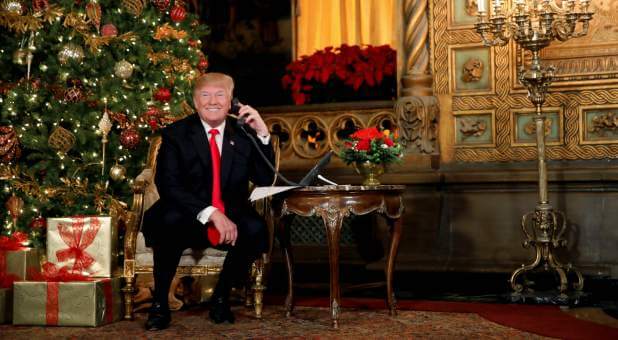For the second consecutive year, President Donald Trump and his conservative evangelical supporters topped the list of the 10 most important religion news stories of the year, according to Religion News Service.
Stephen E. Strang, author of the best-selling book God and Donald Trump, says the fact that “Trumpvelicals” garnered the top spot on the list, which is compiled by the country’s largest organization of religion journalists, is significant, especially with other news stories such as the tragic church shooting in Sutherland Springs, Texas, the Senate candidacy of Judge Roy Moore, the appointments of Neil Gorsuch and other conservative judge, the protests of National Football League players and the 500th anniversary of the Protestant Reformation also making the list.
But, Strang says in his new book, the admiration between Trump and evangelicals was not always mutual.
“Although Donald Trump professes faith in God, he failed the litmus test for many evangelicals early in the campaign,” Strang writes in God and Donald Trump. “There were prominent elements among the wider evangelical leadership who said they despised Trump and, until the very end, worked diligently to derail his election. They couldn’t see beyond his past lifestyle, and they were so blinded by their dislike for him they couldn’t recognize the benefits a Trump presidency would bring for the country and the church compared to the immensely greater dangers of the Clinton alternative.”
“Never-Trumpers,” in their contempt for the future president, did almost anything to destroy him, Strang adds, “even if it meant sending the Clintons and their far-left agenda back to the White House for four more years.”
“As in every political persuasion, there were different levels of animosity, but the heated debate taking place among the faithful not only divided loyalties and ended many long-standing friendships, it also gave the media plenty of fodder to show that the evangelicals were a deeply divided lot,” Strang says. “The frustrations of Middle America that would ultimately catapult Donald Trump to the White House were shared by evangelicals, who make up perhaps the largest segment of Middle America. They were frustrated by the Republican establishment repeatedly taking their support for granted. They were wooed during the election and promptly forgotten when it came time to govern. Many had concluded there wasn’t much difference between moderate Democrats and establishment Republicans on most issues, and that attitude had kept large numbers of evangelical voters away from the polls for years.”
Despite this important relationship that helped Trump win the election—one that still exists today—Trump appears to be anything but evangelical, Strang says. Raised as a mainline Presbyterian, he rarely identified with evangelicals. His marital failures and some of the business interests he has pursued weren’t the sort of things Christians were supposed to do.
“But what was the alternative?” Strang writes. “Hillary Clinton had been raised a Methodist but became radicalized during her college years at Wellesley and was an acolyte of the radical socialist Saul Alinsky. Over the decades, she drifted even further to the left, not only politically but also socially. She became the No. 1 supporter of Planned Parenthood, an advocate for late-term abortions and a proponent of same-sex marriage. She has never had a meaningful outreach to evangelical Christians and referred to conservatives as a ‘basket of deplorables.'”
Slowly but surely, more evangelicals got on board with Trump. Now, a large majority are still aligned with the unconventional president, thanks in part to the fulfillment of the promises he made to Christians around the country, such as strengthening religious liberties protections, the appointing a conservative jurist to the Supreme Court, supporting pastors and churches and keeping the American family a priority. These actions are why evangelicals still staunchly support the president and why his relationship with them was billed as the top religion news story for 2017, Strang says.
Religion News Service also reported that Trump took the title of Religion Newsmaker of the Year as well, ahead of Pope Francis, Protestant reformer Martin Luther and Moore.
In God and Donald Trump, Strang gives an inside look at the journey to the Trump White House through firsthand interviews and perspectives from those who were intimately involved. The book was recently ranked No. 25 on the Evangelical Christian Publishers Association (ECPA) Best-Sellers Top 50 list, as well as No. 24 on the ECPA Non-Fiction list for December 2017.
Strang is an award-winning journalist and successful businessman who began his career as a newspaper reporter at the Orlando Sentinel. He later founded a Christian publishing house and media company while interviewing and writing about nearly every Christian leader in the country over the past four decades.
For more information on God and Donald Trump, visit GodandDonaldTrump.com and view the book’s video. Visitors to the site can also download a free chapter and order the book.
God and Donald Trump is published by Frontline, an imprint of Charisma House, which has published books that challenge, encourage, teach and equip Christians, including 14 New York Times best-sellers.












